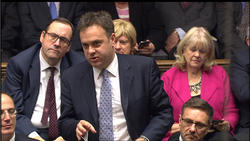Developments in Antibiotic Research
May 15, 2015

Back in July 2014 the Prime Minister commissioned a review team led by Economist Jim O’Neill to look into why so few anti-microbial drugs had been introduced in recent years. The review panel included experts from science, finance, industry, and global health and its aim was to set out plans for encouraging the development of new antibiotics.
The review panel has now produced a report which calls on the global pharmaceutical industry to pay for a $2 billion (£1.3 billion) innovation fund to revitalise research into antibiotics. In return there would be guaranteed payments to companies who produce vitally needed new antibiotics. The fund would be over five years and its aim is to boost funding for ‘blue-sky’ research into drugs and diagnostics, with much of the money going into universities and small biotech companies.
Julian has raised this matter several times in Parliament and hosted a debate on antibiotic resistance. He welcomed the news stating:
“A major problem antibiotic research has faced is keeping pharmaceutical companies engaged in the process, pharma’s need to be incentivised to develop new antimicrobials, because there is currently uncertain commercial returns for new antibiotics. Of the 18 to 20 pharmaceutical companies, who were the main suppliers of new antibiotics 20 years ago, just 4 still persist in the field. As I previously argued in the House of Commons I believe the best solution may be incentives. The key would be to reward companies for creating substantial public-health benefits, which is why I strongly welcome the proposals produced by the review panel.”
Jim O’Neill who heads the panel has stressed that big pharmaceutical companies should pay for the fund and look beyond short-term assessments of profit and loss. He has drawn parallels between the banking crisis and the looming catastrophe of a world where antibiotics no longer worked.
However there is currently one promising area of research called ‘resistance breakers’, these are compounds that work to boost the effectiveness of existing antibiotics and are a far less costly approach than attempting to discover entirely new drugs. Professor Anthony Coates, who Julian has previously met with, founded the company Helperby Therapeutics which has created a resistance breaker that acts against the superbug MRSA. This compound will shortly go into clinical trials in India, and it is this kind of research that could benefit from the innovation fund and could be the key to making existing drugs last longer.
Julian commented:
“It is great to see drug-development receiving this kick-start, and I really hope pharma’s decide to pay into the fund to ensure we are not cast back into the dark ages of medicine. As Jim O’Neill has previously stressed, drug-resistant microbes could kill 10 million people a year worldwide by 2050 and cost $100 trillion in lost economic output. There is no time to waste as the clock is already ticking, I just hope the guaranteed payment incentives to pharma’s proves effective.”



